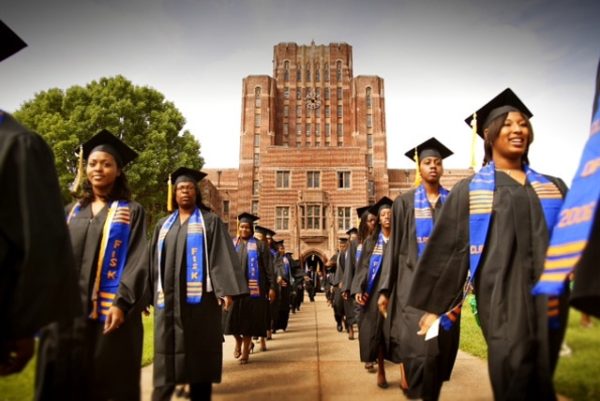Historically Black colleges and universities have a harder time than traditional white institutions when it comes to securing bonds in the capital market. As a result, HBCUs pay 20 percent more in underwriting fees on average to issue bonds that help the schools raise capital.
Research shows the disparity is even more pronounced in Southern states with a history of racial animus toward African-Americans. And according to a 2016 study, it’s simply because bond traders have a harder time convincing wealthy investors to buy bonds from HBCUs.
A U.S. House panel recently heard testimony from one of the researchers behind the 2016 study. It was part of an April 28 hearing titled “Examining the Role of Municipal Bond Markets in Advancing – and Undermining – Economic, Racial and Social Justice.”
Christopher Parsons, a finance professor at the University of Southern California, testified before the House Committee on Financial Services and told the panel that the solution is expanding the municipal bond market by making HBCU bonds tax exempt for debt investors nationwide.
“The effect of this policy would to be remove the tax disadvantages an investor living in, for example, New York or California currently faces when potentially investing in an HBCU-issued bond from another state,” Parsons said during the hearing, according to Bloomberg Equality.
It’s part of a concept known as the “triple tax exemption” that would transfer a state tax benefit currently offered only to investors from the states in which the respective HBCUs are located.
Proponents of the idea think the exemption would make HBCUs viable to investors from other states. They’re now hoping to get buy-in on the solution from federal legislators who could re-introduce a bill that could aid HBCUs.

Municipal bonds are a nearly $4 trillion debt securities market that drives state spending. They are an integral financial tool that help local governments and public institutions raise capital for infrastructure needs such as road improvements, building new schools and highways or revamping a city hall.
They are bankrolled by a market of wealthy investors who buy portions of bonds. Municipal bonds are seen by buyers as low-risk investments because they’re often insured and they’re backed by a municipality’s general tax revenue.
Interest payments that amount to returns on the bonds are exempt from federal taxes. In-state bonds are also exempt from state tax. That means a Georgia investor’s return on a loan to a Peach State municipality is tax-free.
That makes in-state bonds the most attractive to wealthy investors looking to capitalize on their investments.
Bill Mayew, an accounting professor at Duke University’s Fuqua School of Business, said that reality effectively creates a geographic boundary for HBCU bonds. According to Mayew, most of the bond market for the schools comes from investors within the states where they’re located because those investors stand to yield the highest profits.
That could be problematic. Mayew was part of the team of researchers that published the 2016 study showing racism was a driving factor in bonds issued by HBCUs.
“There’s less willing buyers among the wealthy for HBCU bonds, as you get into states that have historically higher racial animus,” he explained in an interview with Atlanta Black Star. “That is the fundamental finding of our paper. It isn’t that banks are doing anything wrong. They’re doing their job. Their job is to find the highest priced buyer for a bond on behalf of the school. It’s just that they, in some sense, have got to knock on a lot more doors to place an HBCU bond than they do to place a non-HBCU bond. And the only explanation that the data shows is that it’s race related.”
The study was inspired by anecdotal stories from bond traders who complained that it was harder to sell HBCU bonds as opposed to those for white universities.
Mayew and his team spent six years analyzing data from over 4,000 tax-exempt municipal bonds issued to 965 colleges and universities between 1988 and 2010. HBCUs accounted for 102 — or 10.5 percent — of the schools sampled.
The researchers took into account each school’s credit rating, in-house resources and experience securing bonds. The result was the same even for AAA-rated HBCUs or those with bonds that were insured, guaranteeing payouts to investors even if they defaulted.
It took investment traders about 20 percent longer to sell bonds for HBCUs. In turn, HBCUs had to pay underwriters 20 percent more in issuance costs to find investors for their bonds. On average, it costs HBCUs about $290,000 in underwriting fees for a $30 million bond as opposed to $242,000 for white schools.
Researchers argued that $48,000 constitutes a heavy financial burden that could be the difference between 10 students getting scholarships or not.
HBCUs in Louisiana, Alabama and Mississippi paid underwriters three times that amount. Researchers referenced studies that ranked those three states as the highest in racial resentment, opposition to affirmative action, as well as racially charged Google searches and tweets in the years after Barack Obama was elected president.
“In the data, we can find reasons to rule out every other explanation you can possibly come up with,” Mayew said. “And it’s remarkably robust that no matter what we do, you get a systematic difference between HBCUs and non-HBCUs. And in effect, the difference between those gets bigger as you move closer and closer to states with the highest racial animus.”
The minimum municipal bond investment is $5,000. One solution researchers offered was to lower that price point for HBCU bonds as a way to expand the market. But those smaller investments would generate lower tax benefits, proponents acknowledge.
The triple-tax exemption is the better fix, according to people like Parsons and Mayew. It’s an idea that’s gained the support of Wall Street trade groups and seems to have traction in Congress.
Mayew said such an exemption would remove the state boundary and incentivize out-of-state investors to buy HBCU bonds.
“It’s just a technical name to say let’s give anybody anywhere a tax exemption for these bonds,” he said. “What that would essentially do is it would remove the geographic captivity that the HBCUs face.”
Congress formalized the idea into a bill that former House Rep. Keith Ellison of Minnesota introduced in September 2016. But the legislation stalled in the then-Republican-controlled Congress.
A large number of the nation’s HBCUs are located in the Deep South in places where racial animus exists. Mayew argued that the schools can’t pack up and move to states like California with more receptive investors.
“It’s really important to have a deep understanding of this, because it’s really easy to give anecdotes about racism,” he said. “It’s much harder to get systematic evidence. And evidence is hard to hard to refute when it’s beyond one data point, someone’s individual perception. I think that’s the power of this thing. My hope is that it gets used to make positive change.”


